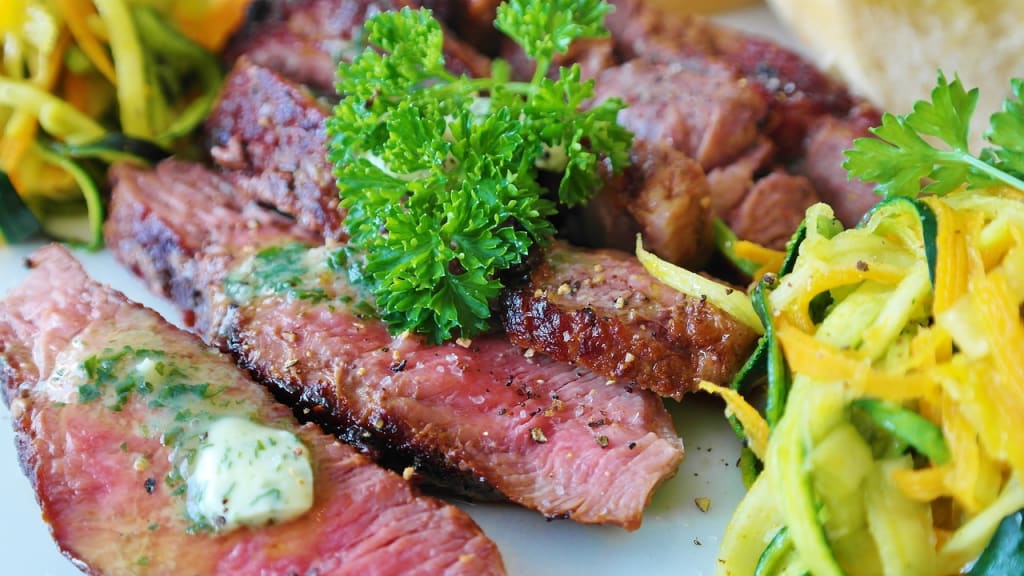Which is better for you: "Real" meat or "fake" meat?
Have you tried it before?

In 2021, a survey of more than 1,000 Americans found that nearly two-thirds had eaten some form of plant-based food in the past year. Many cited the health and environmental benefits as motivation. But are these types of foods better for us and the planet? First, let's introduce the contestants. Meat from slaughtered animals, called forage, has a complex structure consisting of muscle fibers, connective tissue, and fat. You may recognize it from its role in the human diet, dating back to the origins of our species. Our next challengers are the plant-based varieties, which look and taste like meat, but are made from protein, carbohydrates, fats and other plant molecules. Converting plant molecules into something flesh-like takes a lot of effort. The grain of beef is made up of long, stick-like proteins. To model this structure, global proteins can be pushed through an extruder and forced to unravel and join together into long filaments. To mimic animal fats, companies combine fats and oils derived from plants. One popular brand adds colored beet juice that changes the color of the patty as it cooks. Others added an iron molecule called heme, which their team says is key to the food's flavor. There are many types of results. Finally, our final ingredient: lab-grown beef. Also known as stem-cell and cultured beef, these products start with animal stem cells that researchers force to reproduce and build muscle. It should be noted that most lab-grown beef is still in the development phase, so the exact process may vary when it is produced on a larger commercial scale. So which type of meat or similar meat is best for your health? Raised beef is an important source of many proteins and human nutrients. But researchers also found a link between red and processed foods and health problems such as type 2 diabetes and heart disease. A 2012 study concluded that replacing red meat with other foods, such as chicken, beans or peas, in one meal a day reduced the risk of heart disease. by 7 to 19 percent. There is too little data to know if replacing red meat with plant-based bread has the same effect. Plant-grown beef, while having the same amount of protein, calories and iron as farmed beef, is highly processed meat that is high in sodium. Most of them are in coconut oil, which is high in saturated fat and, like red meat, increases the risk of heart disease. At the same time, lab-grown beef can provide the same nutritional benefits and health risks as farmed meat. But we are not sure how to progress product development. So which competitor is better for the environment? The livestock industry is estimated to be responsible for 14.5% of human greenhouse gas emissions. Researchers report that producing plant-based foods produces an average of 90% less greenhouse gas emissions than beef, 63% less than pork, and 51% less less than a chicken. Plant-based crops require less land and water than conventional crops. It produces very little of the pollutants that run off from farms and waterways, posing a threat to the environment and public health. For lab-grown beef, the industry currently harvests stem cells from animal muscle tissue. But in order to increase the production, how many animals are needed to make these biodiesel? It is not clear to what extent alternative foods will reduce the environmental impact of the farmed food industry. What if, instead of replacing food with others, people continued to eat large amounts of organic foods while eating new options? While there's no real way to know which is the best diet, if you're concerned about your personal impact on animal welfare, public health, and the environment, plant-based foods may be at the top of the list. Switching to a different diet is not an all-or-nothing decision. In fact, a 2022 study suggested that cutting red meat to just one serving per day could reduce a person's dietary carbon footprint by 48%.
About the Creator
Rowan Sharkawy
someone who love to know anything & share it with every one
welcome to my profile






Comments
There are no comments for this story
Be the first to respond and start the conversation.